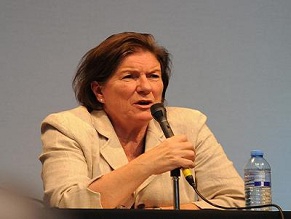|
World Jewish News

Amongst Jenny Tonge’s more sinister comments on the Israeli-Palestinian conflict, however, was a 2006 statement in which she appeared to challenge critics from within her own party, claiming: “The pro-Israel lobby has got its grips on the western world, i
|
Controversial British politician addresses meeting on ‘Britain’s historic responsibility to the Palestinian people’
25.09.2012, Israel and the World British coalition partners the Liberal Democrats drew criticism for scheduling a meeting of the Liberal Democrats Friends of Palestine on the outskirts of its party conference Sunday, at which a banished party member and fierce Israel critic made a keynote address on “Britain’s historic responsibility to the Palestinian People”.
Former MP Baroness Jenny Tonge was made a life peer in 2005, which entitles her to sit in the UK’s highest political chamber, the House of Lords. An often controversial critic of the Jewish State, she has been a strong proponent of forcing the British government to enter into direct dialogue with outlawed group Hamas, insisting that “You don’t make peace by talking to your friends. You make peace by talking to your enemies”.
Despite being largely isolated from the party, which has insisted she “does not speak for the party on Israel and Palestine”, she has found some support within its ranks, as Deputy Leader Simon Hughes claimed ahead of the weekend’s party conference, that rather than seeking infamy, she was motivated by a genuine concern for Palestinian human rights.
Referring to her sometimes inciteful rhetoric, he said it was “not surprising that sometimes these things bubble over and sometimes people speak more intolerantly than they should”. “Like many people when they go to see people in refugee camps and people without adequate food and water, the emotions are very strong,” he added.
Amongst Tonge’s more sinister comments on the Israeli-Palestinian conflict, however, was a 2006 statement in which she appeared to challenge critics from within her own party, claiming: “The pro-Israel lobby has got its grips on the western world, its financial grips. I think they’ve probably got a grip on our party.”
Her political downfall came courtesy of an ill-judged address at an Israeli Apartheid Week at Middlesex University in February 2012, where she said that once the US lost patience with giving aid to “what I call America’s largest aircraft carrier in the Middle East – that is Israel”, “Israel will lose support and then they will reap what they have sown”. Her remarks drew widespread criticism from the party leadership and led party leader and Deputy Prime Minister Nick Clegg to call for her resignation from the party, which she duly gave.
Speaking to British Jewish weekly The Jewish Chronicle last week ahead of the party conference, Hughes continued to call on the Jewish electorate to understand the response of “balanced and rational” political colleagues without “prehistory” on the conflict who have seen apparent human rights abuses in the region and experience genuine feelings of anger and frustration towards the Israeli administration on account of its domestic policy.
Last month, Jewish British Ambassador to Israel Matthew Gould cautioned Israeli TV that “support for Israel is starting to erode” amongst the mainstream international community.
Speaking of the reaction of the British public to reports of Israel’s continued settlement building activity, he said criticism of Israel was not confined to “those people on the fringe who are shouting loudly and calling for boycotts and all the rest of it”, but was fast becoming the majority opinion. “The substance of what’s going wrong is really what’s driving this,” he added.
Speaking of a “growing concern” in the United Kingdom at the perceived lack of progress by Israel towards a peace settlement with Israel, he said: “Israelis might wake up in 10 years times and find out that suddenly the international community has changed, and that patience for continuing the status quo has reduced.”
Despite much focus being placed in Israel on the position of British foreign policy regarding the Palestinian Authority and West Bank settlements, Gould claimed the real dip in opinion came from more ordinary quarters, insisting that “the British public may not be expert, but they are not stupid” when it comes to judging perceived facts for themselves.
EJP
|
|
